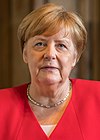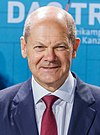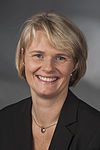Fourth Merkel cabinet
Fourth Cabinet of Angela Merkel Cabinet Merkel IV | |
|---|---|
23rd Cabinet of the Federal Republic of Germany | |
| 14 March 2018 – 26 October 2021 (until 8 December 2021 as caretaker government) | |
 Signing of the coalition agreement for the 19th Bundestag on 12 March 2018 | |
| Date formed | 14 March 2018 |
| Date dissolved | 8 December 2021 (3 years, 8 months, 3 weeks and 3 days) |
| People and organisations | |
| President | Frank-Walter Steinmeier |
| Chancellor | Angela Merkel |
| Vice-Chancellor | Olaf Scholz |
| Member parties | Christian Democratic Union Social Democratic Party Christian Social Union in Bavaria |
| Status in legislature | Grand coalition 399 / 709 (56%) |
| Opposition parties | Alternative for Germany Free Democratic Party The Left The Greens |
| Opposition leaders | Alice Weidel (AfD) & Alexander Gauland (AfD) |
| History | |
| Election(s) | 2017 federal election |
| Legislature term(s) | 19th Bundestag |
| Predecessor | Merkel III |
| Successor | Scholz |
| ||
|---|---|---|
Revolution of 1989 Kohl government Leader of the Christian Democratic Union First ministry and term
Second ministry and term
Third ministry and term
Fourth ministry and term  |
||
The Fourth Merkel cabinet (German: Kabinett Merkel IV) was the 23rd Government of the Federal Republic of Germany during the 19th legislative session of the Bundestag. It was sworn in on 14 March 2018 following the 2017 federal election and dismissed on 26 October 2021, acting in a caretaker mode until 8 December 2021. It was preceded by the third Merkel cabinet and succeeded by the Scholz cabinet. Led by Chancellor Angela Merkel, it was the third cabinet under Merkel to be supported by a coalition of the Christian Democratic Union (CDU), the Christian Social Union of Bavaria (CSU), and the Social Democratic Party (SPD).
Composition[edit]
The cabinet consists of Chancellor Angela Merkel and fifteen (fourteen since 20 May 2021) federal ministers. Olaf Scholz (SPD) replaced Sigmar Gabriel as Vice Chancellor and CSU Leader Horst Seehofer became Federal Minister of the Interior, Building and Community. Fourteen ministers head a department (since 20 May 2021, one minister heads two departments); one member of the cabinet, the Head of the Chancellery, is Federal Minister for Special Affairs without a portfolio. The CDU has seven positions, the SPD has six and the CSU has three, as follows:
2018 government crisis[edit]
In June 2018, a government crisis erupted within the cabinet between Interior Minister and CSU Chairman Horst Seehofer and Chancellor Angela Merkel, after Seehofer had elaborated a masterplan on asylum policies, containing the rejection of asylum seekers already registered in other EU countries.[2] Seehofer had threatened to resign over the crisis on 1 July, but an agreement was made between the CDU/CSU sister parties on 2 July.[3]
Caretaker government[edit]
The results of the 2017 election had necessitated a series of negotiations that required the Merkel III cabinet to remain in a caretaker capacity for a prolonged period of time (into 2018). Government formation after the 2021 elections lasted until 24 November 2021,[4] and the caretaker government continued until December 8,[5] making Merkel just 9 days short of the record for longest-serving Chancellor in post-war German history ahead of Helmut Kohl.[6]
References[edit]
- ^ German Chancellery (15 March 2018). "Liste der Bundesministerinnen und Bundesminister" [List of Federal Ministers]. Protokoll Inland der Bundesregierung (in German). German Federal Ministry of the Interior. Retrieved 16 March 2014.
- ^ German government crisis: What are Merkel's options?, Reuters, 2 July 2018
- ^ Chancellor Angela Merkel and Horst Seehofer agree on a migration compromise, Deutsche Welle, 2 July 2018
- ^ "German parties reach a deal to form a coalition government as the era of Merkel ends". NPR. 24 November 2021.
- ^ "Germany's Olaf Scholz takes over from Merkel as chancellor". BBC News. 8 December 2021.
- ^ "Angela Merkel's party beaten in Germany election, but she will remain Chancellor for now. Here's why". ABC News. 26 September 2021.
External links[edit]
- Cabinet of Germany Archived 2021-10-27 at the Wayback Machine (English)
- Federal Ministries of Germany (English)



































